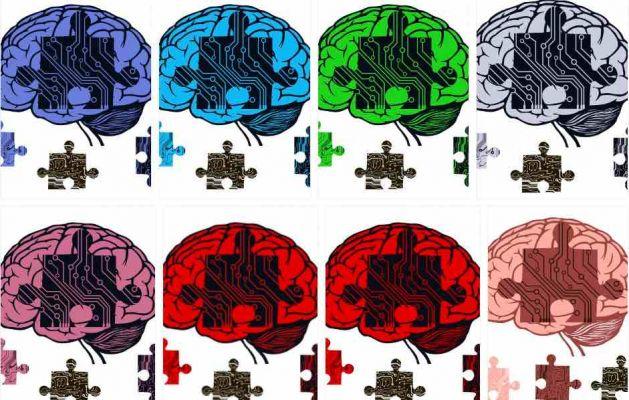
Know store quickly it's a bit like the Holy Grail, the most important skill for anyone who has to study or learn something.
Don't get me wrong: this does not mean that it is not important - as everyone says - to understand what one reads or studies.
The point, however, is that "understanding", in most cases, is not that difficult: maybe for some concept it takes a little longer, but in the end, in most areas, we can understand always almost everything and pretty quickly.
It is not there, therefore, that we waste most of our time and energy, but it is in memorizing.
I tell you with full knowledge of the facts!
In fact, I receive hundreds of emails a year from people of all ages who tell me about their learning difficulties, and I assure you that the vast majority of them always strike the same thing: "I can't / I struggle / I'm slow to memorize".
And the problem does not concern only those who study.
To me, for example, when I read an essay or a manual or even an internet article like this that you are reading now, I rarely stop because I did not understand a thing.
In return, if I don't take the time and effort to memorize what I read, in the end I remember very little, which is a bit like not having read at all. (see the article on how to remember the books you read).
Isn't that the case for you too?
So if you are interested in saving time when studying or learning, the lever on which you need to act is to find out how store quickly.
In this article we will look at 8 ways to do this.
1. If you don't understand, don't start memorizing
Eh eh eh ... I know, starting with this rule is typical of my questionable humor.
What I said before is true, understanding doesn't take a lot of time, but…. if you don't, that's it memorizing quickly becomes even more difficult.
You need to know that our neurons, in order to remember better, need to establish each other strong relationships, through the passage of electrical discharges and the release of neurotransmitters.
And, as in life, nothing strengthens a relationship as much as understanding ....
If you do not understand the information you are trying to memorize, it will scatter over your neurons in small packets completely disconnected from each other. So remembering one piece won't help you remember the rest that much.
When instead understand what you read or hear, this scattering is immediately better, better organized, more interconnected ...
You may not remember anything the same, but let's say that you started off on the right foot to store quickly.
Go to Amazon to see my manual
2. Without Attention and Intention, memorizing is very long
On a shelf near the fridge in my in-laws' country house are two appliances, the blender and the microwave, and only one socket is available because the other is broken.
For this reason, the microwave and the blender are always disconnected, and to use them you have to connect the relative cable each time. The cables have two different colors, one white and one black.
And, as the two appliances are placed, you never understand to which of the two cables one or the other belongs.
Believe me, after 100 times, I still happen to be wrong attaching the microwave instead of the blender or vice versa.
Why? Why I have never made the conscious effort to memorize once and for all which is the one and which is the other.
I always arrive there and, absently, I try to attack one of the two.
The same thing can happen when you study: do not think that, by simple repetition, things will transfer themselves into your mind.
If you do not have the intention to store and do not use attention adequate to do so, you can repeat the same thing a hundred times without ever getting to know it precisely.
A bit like someone who repeats the lesson by constantly peeking at the book and thinking about his own business: instead of memorizing quickly, it repeats quickly!
But it stores very little.
3. Repeat correctly.
We just talked about it ...
Repeating takes a long time and therefore, if you are distracted, if you constantly cast your eyes on the book, if you do not have the right times, you can only waste a lot of hours.
To memorize quickly, it is essential to repeat correctly.
To do it:
- Use Active Recall: When you read a text or listen to a presentation or whatever else you want to learn, every now and then stop and squeeze your brain to remember it. Without breaking through on notes or books, without resending the registration, without helping you in any way. Simply, rummage in your mind looking for any glimmer of memory and only then go to verify its correctness. You will see how your storage capacity will improve quickly.
- Use spaced repetition: repeating something for 3 hours and three times in a day is not the same as repeating it for 3 hours on 3 different days of the week. Science tells us that when memorization sessions are at an optimal distance from each other, they also tire you less allow info to settle and consolidate better. And therefore you memorize much faster.
4. It stores faster with pictures
It is a fact that we store images much better some words.
Read for example this sentence:
The tyrannosaur's head was exceptionally massive, up to 1 meters long and, compared to other previous and contemporary theropods, heavily modified in shape. The posterior area of the skull was greatly enlarged, while the muzzle narrowed in correspondence with the nostrils. As a result, the eyes were able to have an excellent field of vision in the anterior and anterior / inferior region ...
It took you about 15 seconds and you probably remember 2-3 pieces of information.
Now, imagine you have in front of you, for 15 seconds, the huge, grinding head of a tyrannosaurus…. If you get out alive, you will have memorized dozens of information about it and about the rest of the animal by that time.
The reasons for the overwhelming mnemonic superiority of images over words there are many and you can find them summarized in this article, as well as the correct ways to memorize by viewing.
Here I will just say that you must continually try to transform the information in meaningful, detailed images, as explanatory as possible.
This will make it much easier for you to memorize everything quickly.
Do not just turn the sound of the words you read or hear in your head, but see them as if they were a movie, creating in your brain a true virtual reality of all you need to remember.
5. If you need to memorize numbers, use phonetic conversion
It takes some time to learn this technique, so I only recommend it if you often have to memorize numbers quickly.
The principle is relatively simple:
- You have to learn a system that codes each number in a consonant sound, according to a scheme invented by the philosopher Leibniz (and therefore the 1 will be for example the T or the D, the 2 the N, the 3 the M, and so on)
- You must use the resulting consonants for form a word
- You must transform the word thus found in an image
- You must store the image in question, which we have seen to be very easy.
- You must finally do the reverse process, from image to number, when you have to remember the latter.
And so, for example, to remember a number like 7 3 9 1 4 9 4 1 1 5 you just need an image like a "laptop"
I know, that said it sounds a bit cryptic, but in reality it is a system that is as ingenious and powerful as it is simple.
It will only take you half a day to learn how it works and a few hours of training a week to become comfortable in using it…. then, you will be able to memorize numbers with absolutely super-human speed, truly incredible for those unfamiliar with the technique.
Learn more about the phonetic conversion technique on this article.
6. Use and create acronyms
The 40-year-old generation like me still remembers MA WITH GRAN PENa LE RE-CA GIÙ, the legendary phrase-acronym learned in elementary school to store quickly the partition of the Alps (Marittime, Cozie, Graie and so on).
But even when I was studying medicine and I had to quickly memorize hundreds of information, I made very extensive use of acronyms.
Many were already beautifully ready and made (medicine is the realm of acronyms, now almost all in English: they constitute a sort of encrypted and universal language to communicate between doctors).
But I also liked it build my own, original ones, especially to learn some short lists (for the long ones I used the loci technique more often) or very difficult names.
Converting what you study into acronyms helps you memorize quickly for two reasons:
- Compress long information into shorter and therefore easier to remember words
- Make an effort of synthesis and creativity, e memory feeds on effort!
7. Memorize words quickly thanks to the Keyword method
For foreign words, there is nothing better than the keyword method.
The principle is simple: it will have happened to you a thousand times to say "I have this word on the tip of my tongue but I don't remember it" and then, even if only thanks to a small clue, suddenly remember it.
Here, the kewyord method is the art of constructing these kinds of clues through the assonance between words.
For example, in the mind of someone using the kewyord method:
- A word like Wand, which in German means wall, is remembered perhaps by visualizing VANDals hammering into a wall.
- Cefaclor, a second generation cephalosporin, becomes a CEFAlo swimming in a chlorine-filled pool.
- The gastrocnemius, which is a muscle, can be represented by the little fish Nemo with gastritis
As you can see from the examples, the keyword doesn't have to match exactly what you need to remember. Just give you a well-done clue.
Those who use this method, which seems convoluted at first but then turns out to be simple, can learn as many as 100 foreign (or just weird) words in an hour or two.
But, as with all memorization techniques, it is not an improvised skill: you have to understand how it works and practice (you can go further in my article on the Keyword Method).
8. Memorize by building palaces
The palace of memory (or technique of the loci) is the queen and the most famous of the quick memorization techniques.
Its principles are very simple:
- Transform what you need to learn in an image
- Associate this image to others mental images already present in your memory (e.g. the front door, the doormat, your bed)
In this way you memorize quickly because you create a link between short-term memories and long-term memories, and you do it through images.
While the principle is very simple, practical application is quite difficult.
For this reason, I advise you not to leave overnight your established storage systems to replace them with the palace: proceed instead by experiments and step by step, starting with simple memorizations and then moving to memorize increasingly complex things.
You can learn more about the palace of memories on my free guide "How to build a real Mental Palace"
And you can get some practice with my mega-exercise on the loci technique.
To memorize quickly you have to struggle ... and rightly so.
I conclude this article by talking about a great misunderstanding into which many fall when they think that memorizing fast also means memorizing easily.
Maybe imagining themselves stretched out and relaxed on the sofa as things magically move into their minds.
instead, memorize quickly and memorize effortlessly they are two very different things.
If you notice, indeed, all memorization rules I told you about, to work, they require a certain effort: you have to organize, understand, repeat, pay attention, create imaginative images, associate ...
They are activities that are anything but passive or effortless.
And so, you can learn 100 foreign words in one hour if you want, which is very, very quickly…. but to do so you cannot escape the effort, not just a little, of produce evocative images and connect them together.
You can use the memory palace to learn the names of all antibiotics in a very short time… but you have to dedicate yourself to first build it and organize it with care.
You can finally remember if the microwave sticks with the black or white cable, or where you left your car keys this morning…. but before you have to make up your mind and decide that you really want to memorize the information in question.
The fact is that thinking you can memorize quickly and effortlessly is more than an illusion, it's a real nonsense.
Why effort is what allows your neurons to increase their connections, their frequency and discharge strength, the quantity of signals they exchange ...
So when you try to understand how to memorize quickly, do not fall into the illusion that it will not cost you effort, but rather, accept fatigue as something normal and stimulating.
You will see that speed feeds on energy, but it gives you time and satisfaction in return.
A greeting. Anthony.


























